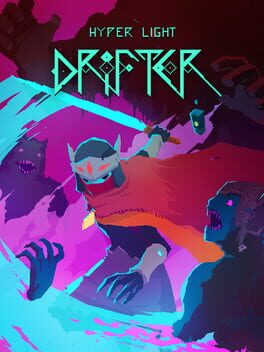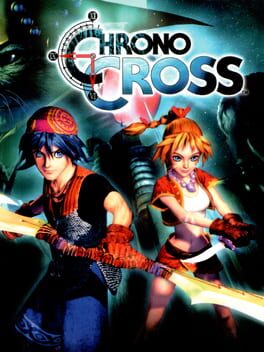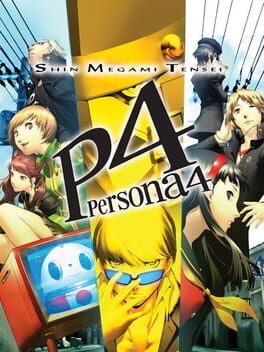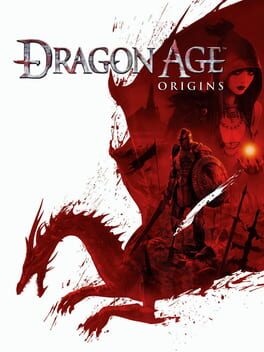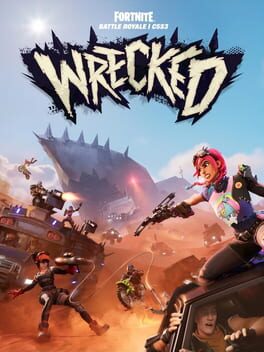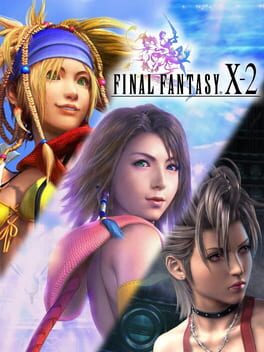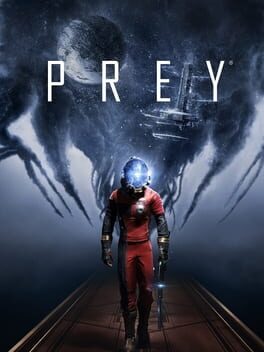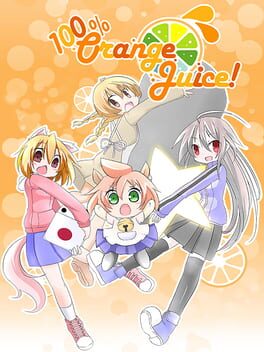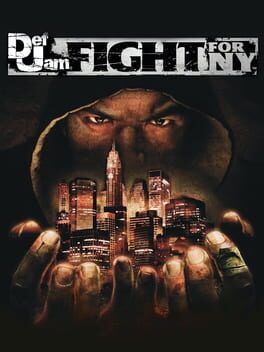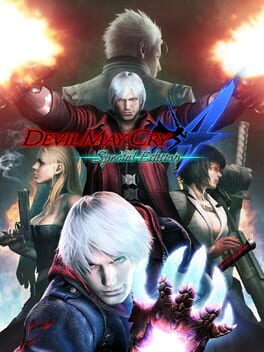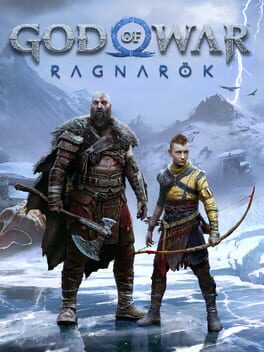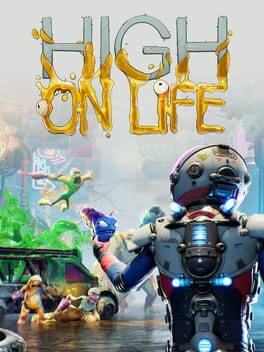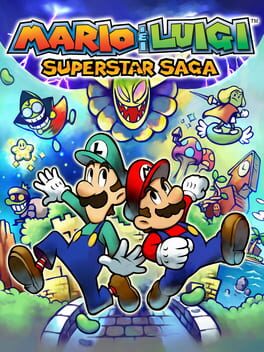sondi
BACKER
370 Reviews liked by sondi
Hyper Light Drifter
2016
This is an undeniably gorgeous game where every scene is dripping in detail, backed by a fitting and somber soundtrack. The world is built uniquely through picture based dialogue instead of text which only aids the aesthetic. The gameplay itself is where the game is a bit more rote. I did enjoy it and found it to be solid, but it felt like something was lacking. By the end of the game, the combat was feeling fairly repetitive, especially because the underground areas all start to blend together regardless of the outside areas' unique backdrops. It's definitely a good game, but greatness feels just out of its grasp.
Chrono Cross
1999
The idea of making a sequel to Chrono Trigger seems like a fool's errand, but surprisingly enough, the direction of Chrono Cross as a sequel is magnificent. They could have bitten off Trigger and made a budget-heavy, digestible sequel, but they didn’t. When sequels are made, creators can look back and improve upon their past mistakes. So looking at Trigger, what is there to change? There’s nothing inherently wrong with it, so how can it be improved in a sequel? This is why I respect the vision of Chrono Cross so much as a game and especially as a sequel. It doesn’t do the same thing better, but it rethinks the genre entirely.
Cross introduces so many quality-of-life gaming mechanics that have gone widely unused in the genre outside of its release period, and that is a shame. Gaming has instead leaned into battering you with where you need to be next with a marker indicating where to go, ensuring you’ll never be questioning what to do next. That’s the difference with Chrono Cross. Modern gaming is the equivalent of that one teacher in elementary school who was a little too nice and gave you the answers on your test when they shouldn’t have. Chrono Cross is instead like a well-trained tutor that gives you the tools you need to succeed but doesn’t flat-out give you the answers and makes you figure it out on your own.
One of the features added that signifies this game's new direction is the ability to run away from boss battles with a 100 percent success rate. If you’re not equipped with magic suited for the fight, used the wrong spell, were about to die, or just didn’t like the way the fight played out, you’re welcome to run away from any fight you want with no penalty. Most games will let you retry a fight after death with no repercussions now, but you’ve got to remember, this was 1999! It doesn’t want you to lose hours of progress from something you couldn’t see coming and instead gives you all the attempts you need to figure out how to beat bosses.
The gimmick of Chrono Cross's combat is equipable moves. They act as an item of sorts, and you can find them in dungeons or in shops. You need to balance out buffs, consumables, attack magic, and the like in the limited slots available. What makes this weird, though, is that once you use one of these moves, you’re not able to use it again for the duration of the battle, so what you have equipped always matters. That also means that all your magic will be recharged for the next battle. I love this, to put it bluntly. There’s no anxiety about saving all your MP for a boss battle; instead, you’re just expected to have fun and use what you have without repercussion.
It just makes Cross have this easy-going and well-balanced experience. You’re not required to constantly re-equip yourself in towns or stop at inns. You just kind of, well, play the game. I’m making the game sound like it's way too easy, but no. It has a great difficulty curve, which I’ve come to expect from Square. The way it maintains the difficulty throughout the game, though, is through its fixed leveling. After defeating bosses in the story, sometimes you’ll unlock growth levels. These basically allow you to level up your stats from completing battles up until a certain point and lock off stat gains until you get more growth levels. In other words, Chrono Cross found a plausible solution to creating a grind-free RPG, and it works great. FF8 tried to get rid of grinding too, but it was flawed in its fundamentals by implying that you draw a surplus of moves from enemies, which is a different facet of grinding. It also punished the player for grinding by having dynamic leveling that made enemies harder as you leveled up, which is quite evil for the blind player. It feels like they took into account the flaws of FF8 and reworked them to be less obtuse and more user-friendly.
One of my favorite parts of Cross is its Suikoden-esque gameplay. Cross is, I guess, in the niche sub-genre of character-collecting RPGs. There’s 45 playable characters to get in the game, and instead of heading back to the castle to swap out party members in Suikoden, you can just swap them out whenever you want on the overworld. It was surprising to find a QOL I wanted in Suikoden lying in Chrono Cross this entire time. Obviously, not all these characters are good; many get much more screen time than others. Many stick out, though, my favorite being Karsh, as I loved his character arc. My favorite part about them is all of their connecting backgrounds. Instead of our traditional band of 7 or so party members, Cross focuses on building the world on a broader scale with a large number of characters to choose from, with many being interconnected in some way or another.
Square’s golden era was during the PS1, and Chrono Cross is a finite example of that. It showcases Square’s innovation and their ability to be effectively experimental, but unfortunately, it didn’t have the impact it rightfully deserved. Much of Cross's game design went unnoticed in the grand scheme of things, as it has many features that I think could have become the norm for RPGs but just didn’t catch on as well as something like FF7. I’ll close by saying that Chrono Cross is one of the best sequels of all time and should serve as an example of what makes a great one. It takes place in a brand new setting and has completely reformed gameplay. Everything is different, almost unrecognizable at first, but the way it intertwines itself into the series is superb.
Cross introduces so many quality-of-life gaming mechanics that have gone widely unused in the genre outside of its release period, and that is a shame. Gaming has instead leaned into battering you with where you need to be next with a marker indicating where to go, ensuring you’ll never be questioning what to do next. That’s the difference with Chrono Cross. Modern gaming is the equivalent of that one teacher in elementary school who was a little too nice and gave you the answers on your test when they shouldn’t have. Chrono Cross is instead like a well-trained tutor that gives you the tools you need to succeed but doesn’t flat-out give you the answers and makes you figure it out on your own.
One of the features added that signifies this game's new direction is the ability to run away from boss battles with a 100 percent success rate. If you’re not equipped with magic suited for the fight, used the wrong spell, were about to die, or just didn’t like the way the fight played out, you’re welcome to run away from any fight you want with no penalty. Most games will let you retry a fight after death with no repercussions now, but you’ve got to remember, this was 1999! It doesn’t want you to lose hours of progress from something you couldn’t see coming and instead gives you all the attempts you need to figure out how to beat bosses.
The gimmick of Chrono Cross's combat is equipable moves. They act as an item of sorts, and you can find them in dungeons or in shops. You need to balance out buffs, consumables, attack magic, and the like in the limited slots available. What makes this weird, though, is that once you use one of these moves, you’re not able to use it again for the duration of the battle, so what you have equipped always matters. That also means that all your magic will be recharged for the next battle. I love this, to put it bluntly. There’s no anxiety about saving all your MP for a boss battle; instead, you’re just expected to have fun and use what you have without repercussion.
It just makes Cross have this easy-going and well-balanced experience. You’re not required to constantly re-equip yourself in towns or stop at inns. You just kind of, well, play the game. I’m making the game sound like it's way too easy, but no. It has a great difficulty curve, which I’ve come to expect from Square. The way it maintains the difficulty throughout the game, though, is through its fixed leveling. After defeating bosses in the story, sometimes you’ll unlock growth levels. These basically allow you to level up your stats from completing battles up until a certain point and lock off stat gains until you get more growth levels. In other words, Chrono Cross found a plausible solution to creating a grind-free RPG, and it works great. FF8 tried to get rid of grinding too, but it was flawed in its fundamentals by implying that you draw a surplus of moves from enemies, which is a different facet of grinding. It also punished the player for grinding by having dynamic leveling that made enemies harder as you leveled up, which is quite evil for the blind player. It feels like they took into account the flaws of FF8 and reworked them to be less obtuse and more user-friendly.
One of my favorite parts of Cross is its Suikoden-esque gameplay. Cross is, I guess, in the niche sub-genre of character-collecting RPGs. There’s 45 playable characters to get in the game, and instead of heading back to the castle to swap out party members in Suikoden, you can just swap them out whenever you want on the overworld. It was surprising to find a QOL I wanted in Suikoden lying in Chrono Cross this entire time. Obviously, not all these characters are good; many get much more screen time than others. Many stick out, though, my favorite being Karsh, as I loved his character arc. My favorite part about them is all of their connecting backgrounds. Instead of our traditional band of 7 or so party members, Cross focuses on building the world on a broader scale with a large number of characters to choose from, with many being interconnected in some way or another.
Square’s golden era was during the PS1, and Chrono Cross is a finite example of that. It showcases Square’s innovation and their ability to be effectively experimental, but unfortunately, it didn’t have the impact it rightfully deserved. Much of Cross's game design went unnoticed in the grand scheme of things, as it has many features that I think could have become the norm for RPGs but just didn’t catch on as well as something like FF7. I’ll close by saying that Chrono Cross is one of the best sequels of all time and should serve as an example of what makes a great one. It takes place in a brand new setting and has completely reformed gameplay. Everything is different, almost unrecognizable at first, but the way it intertwines itself into the series is superb.
Persona 4
2008
Dragon Age: Origins
2009
A very rare example where I started off Origins being very unsure about it and then progressively enjoyed it more and more until I pretty much loved it by the end.
It was a tough hang at first. Origins doesn't look great even by 2009 standards, and if you're not expecting MMO-style combat it can all feel a little awkward at first. But the combat grew on me (I played elf mage) as I went along and got more powers, and I clicked with the gameplay overall once I realized Bioware was going for a heavily streamlined Baldur's Gate-style RPG. And to that, they did an excellent job.
The writing was also top notch -- as good as the best Mass Effect stuff -- and despite there not being a ton of environments or what have you Bioware made it feel like you were going on a grand adventure to unite the nations and combat a larger, frightening threat. Although I think the final combat encounters were somewhat annoying, the narrative in the back third is thrilling.
So glad I played this. Going to play the Awakening DLC next, then DA2, then Inquisition!
It was a tough hang at first. Origins doesn't look great even by 2009 standards, and if you're not expecting MMO-style combat it can all feel a little awkward at first. But the combat grew on me (I played elf mage) as I went along and got more powers, and I clicked with the gameplay overall once I realized Bioware was going for a heavily streamlined Baldur's Gate-style RPG. And to that, they did an excellent job.
The writing was also top notch -- as good as the best Mass Effect stuff -- and despite there not being a ton of environments or what have you Bioware made it feel like you were going on a grand adventure to unite the nations and combat a larger, frightening threat. Although I think the final combat encounters were somewhat annoying, the narrative in the back third is thrilling.
So glad I played this. Going to play the Awakening DLC next, then DA2, then Inquisition!
Hi-Fi Rush
2023
To me, it's a sign of a really good game in this genre when immediately after finishing, I feel the urge to start another run through. Hi-Fi Rush shows this sign. For a casual "just beat all the levels on normal" playthrough, the rhythm mechanic is cool, and generally not that obtrusive once you adapt to it. In later areas (and, from my limited experience with them, at higher difficulty levels), it becomes an incredibly useful tool for timing your defensive maneuvers, so you feel like some kind of genius with the parry just because you know how to spam it to the beat of the song (though, as it should, this strategy comes with drawbacks). Probably more importantly than all that, it just makes things a lot more fun! Sections that might otherwise feel like they have unremarkable music or very basic navigation become self-imposed playgrounds to hone your rhythm so you've got it down once a fight comes up, and correctly timed inputs actually matter.
Enemy variety could be better, but with the length of the game, it's not that much of a problem. The way enemy groups are mixed together in any given encounter ends up mattering more, and at later levels, they seem to mix up their moves a little bit as well; more enemies might make it more difficult to recognize their weaknesses or attack tells.
The amount of post-game content on offer also feels like such a bonus. I've always got to respect when developers add a sort of roguelite-ish mode based around the vanilla gameplay of their game, so shoutouts to Tango for that one; fantastic idea. It really seems like there's a lot to challenge players who breeze through the Normal difficulty main story, without making players who can't quite get the hang of higher-level play feel like they're missing out.
My biggest complaints feel like they could just be skill issues. Certain attacks feel like they're hard to recognize the tells for. Some enemies that require specific moves to be vulnerable consequently take a long time to kill. I'm sure if I put more time into the game, or specced my character the right way, these issues might just disappear.
All in all, pretty fantastic game. And I hear Tango Gameworks wants to make a sequel! I'm sure it'll be even better. I'm going to post this review and then look up what all those developers are doing now. I hope they all got a raise or something! EDIT: oh no
Enemy variety could be better, but with the length of the game, it's not that much of a problem. The way enemy groups are mixed together in any given encounter ends up mattering more, and at later levels, they seem to mix up their moves a little bit as well; more enemies might make it more difficult to recognize their weaknesses or attack tells.
The amount of post-game content on offer also feels like such a bonus. I've always got to respect when developers add a sort of roguelite-ish mode based around the vanilla gameplay of their game, so shoutouts to Tango for that one; fantastic idea. It really seems like there's a lot to challenge players who breeze through the Normal difficulty main story, without making players who can't quite get the hang of higher-level play feel like they're missing out.
My biggest complaints feel like they could just be skill issues. Certain attacks feel like they're hard to recognize the tells for. Some enemies that require specific moves to be vulnerable consequently take a long time to kill. I'm sure if I put more time into the game, or specced my character the right way, these issues might just disappear.
All in all, pretty fantastic game. And I hear Tango Gameworks wants to make a sequel! I'm sure it'll be even better. I'm going to post this review and then look up what all those developers are doing now. I hope they all got a raise or something! EDIT: oh no
Portal
2007
So back when reviewing Aperture Desk Job for the steamdeck some people were surprised it was the first Valve game I had played. The thing is that I stopped PC gaming in the mid 90's and have always been a console gamer either through finances or where friends played but getting a steamdeck and joining steam's eco system really opened my eyes quite a bit. I even bought a gaming PC and have been venturing into it steadily. I still love my consoles and retro gaming but having more avenues to experience titles in different ways is never a bad thing.
With that in mind and the Aperture Desk Job link to Portal I figured I should finally play this well know piece of gaming history I have a blank on. Now I'm not really a puzzle gamer. I dabble in a few here and there but it's just not really to my tastes as I get impatient if that is all I am doing. Portal feels like it has a great balance of puzzles being both overly simple and challenging at the same time. I never felt I was breezing through but rarely felt stuck, at the minimum I could see what I needed to do even if occasionally pulling it off wasn't so easy.
Portal's gameplay is in it's very name. You create portals using a gun whilst going through test areas in the Aperture Science Enrichment Centre. Each area has different puzzles and sometimes multiple rooms to figure out to get to the elevator to the next area. It's a linear game and though your mechanics are limited to creating two portals that link and picking up boxes it's impressive how far Valve manages to inspire you to use them in different ways. Creating paths for energy balls to power up doors, getting into seemingly locked off rooms and my favourite, using multiple portals to get the velocity to launch yourself, or as GLaDOS your Aperture computer guide states:
"speedy thing goes in, speedy thing comes out"
Now if the game was just the puzzles I'd be a little luke warm about it being just kind of ok but the writing and voice acting do a lot of heavy lifting to pull Portal up to something more I feel. The only real voiced character is GLaDOS but her sarcasm, dry tone and implications as the game progresses are really witty and entertaining. Without her this would be a decent puzzle game but with her it's a great overall experience.
Glad I finally played it and have been dabbling with some of the extras like the advanced maps and challenges. The game is pretty short which to me is not a negative here. It's a game that knows not to wear out it's welcome while keeping things entertaining and I look forward to playing it's much lauded sequel sometime in the future.
Recommended.
+ Puzzles are balanced well.
+ GLaDOS is often hilarious and keeps the game from getting stale as you progress.
+ Just the right length.
With that in mind and the Aperture Desk Job link to Portal I figured I should finally play this well know piece of gaming history I have a blank on. Now I'm not really a puzzle gamer. I dabble in a few here and there but it's just not really to my tastes as I get impatient if that is all I am doing. Portal feels like it has a great balance of puzzles being both overly simple and challenging at the same time. I never felt I was breezing through but rarely felt stuck, at the minimum I could see what I needed to do even if occasionally pulling it off wasn't so easy.
Portal's gameplay is in it's very name. You create portals using a gun whilst going through test areas in the Aperture Science Enrichment Centre. Each area has different puzzles and sometimes multiple rooms to figure out to get to the elevator to the next area. It's a linear game and though your mechanics are limited to creating two portals that link and picking up boxes it's impressive how far Valve manages to inspire you to use them in different ways. Creating paths for energy balls to power up doors, getting into seemingly locked off rooms and my favourite, using multiple portals to get the velocity to launch yourself, or as GLaDOS your Aperture computer guide states:
"speedy thing goes in, speedy thing comes out"
Now if the game was just the puzzles I'd be a little luke warm about it being just kind of ok but the writing and voice acting do a lot of heavy lifting to pull Portal up to something more I feel. The only real voiced character is GLaDOS but her sarcasm, dry tone and implications as the game progresses are really witty and entertaining. Without her this would be a decent puzzle game but with her it's a great overall experience.
Glad I finally played it and have been dabbling with some of the extras like the advanced maps and challenges. The game is pretty short which to me is not a negative here. It's a game that knows not to wear out it's welcome while keeping things entertaining and I look forward to playing it's much lauded sequel sometime in the future.
Recommended.
+ Puzzles are balanced well.
+ GLaDOS is often hilarious and keeps the game from getting stale as you progress.
+ Just the right length.
Final Fantasy X-2
2003
The most pointless game ever made in terms of narrative and reason for existence. I get they made it because 10 sold well, but this butchers an otherwise great story by continuing what should not have been continued. The job system or whatever quirky bullshit name they decided to call it was not what people hyped it up to be, though I probably would have ended up liking it a lot more if the story wasn't written as a death letter to one of my favorite endings. Honestly this is comparable to the answer from persona 3 fes because they both completely miss the point of their original games stories and are made to be cheap cash grabs to entice dumb asses like me into playing more slop. I would go as far to say that this game is final fantasy's persona 3 the answer
Prey
2017
We may never get another gaming year like 2017. Looking back, the sheer amount of absolute banger titles released that year just seems unfathomable to me. Among others, some of my personal favorites released in 2017 were NieR Automata, Persona 5, Dragon Quest XI, Divinity Original Sin 2, Breath of the Wild, and so so many more. With that many top tier games released in such a relatively short time, it is only natural that some titles didn't get the recognition they undoubtedly deserved. I feel like that was the case with Prey, the second to last game developed by Arkane Austin, a studio known for its strong focus on immersive sim games. I remember following the overall gaming discourse back in 2017 quite rigorously and while I do remember some outlets speaking about Prey and praising its qualities in terms of worldbuilding, storytelling and freedom of choice, I do feel like this game flew under the radar a bit. That’s probably why I wasn’t super hyped to play this game when it released. Like with so many other games, I just put Prey on my wishlist, let it rest there for a while and finally decided to buy it on sale years later. And still, I wouldn’t play it. For years and years, this game was sitting in my library, becoming one of those titles, I would surely pick up at some point in the future. That’s a shame because, having finished it now, I think I was sleeping on one of the, if not the, best immersive sim games ever created. The push to finally give this game a try came upon reading the news that Microsoft had decided to close down Arkane Austin for good. I remembered that, before the (Red)fall of this company, they had worked on games I was interested in but never found the time to play. So, the time had finally come. I sat down and started playing Prey.
And what a journey it was.
I’m gonna keep this review short. For me, this is one of those games, people should experience with as little prior knowledge as possible. That’s how I approached the game and I’m happy I did. Prey is an immersive sim in all the best ways. This genre, if it can be called that, is all about player freedom. A good immersive sim presents an intriguing premise for the story and world of the game, puts the player into a semi open world, and lets them approach a number of objectives in multiple ways. It’s a formula that was first established by the Ultima and Thief games and has since then been revised and advanced by games like Deus Ex and Dishonored. Having played Prey now, I think this formula has come to a sort of perfect conclusion with this game.
From the first seconds of the game, Prey knows exactly what it’s doing. As you’ve probably guessed by looking at screenshots or trailers for the game, Prey is a Sci-Fi story that plays with you as much as you play it. There’s an all-encompassing feeling of “wrongness” in everything you see, like something just doesn’t really add up. Playing Prey feels like playing a mind game. The first couple of minutes make it very clear that this is intended by the developers. You’re supposed to question what you see. And so, you’ll end up asking yourself if what you see is real or just an illusion, a mimic of reality. But Prey is more than that. It deals with questions of humanity, identity, technological progress and morality. Only on its front is it a Sci-Fi story with a cosmic horror twist. Prey is a deeply human story that is not afraid to question the cost of technological advancement, touching on topics like the value of human life in a world dictated by corporate greed and the never-ending hunt for profit, no matter the cost. That’s a premise that immediately hooked me. I wanted to know more about this version of our world, where John F. Kennedy survived his assassination attempt, launching the world into a new era of space exploration. I had so many questions in my head that needed answering. What’s the point of Talos I? What’s a Neuromod? What happened on this station and who are we anyway? Step by step, the game will have answers for you, some of which will be hard and unforgiving truths whereas other will pose even more questions. And sometimes, there’s no right and wrong and it’s up to you to decide how to interpret the “truth”.
Freedom and choice, that’s what it’s all about in an immersive sim. Not only is that reflected in Prey’s narrative, it’s also a significant aspect of its gameplay. Every challenge the game offers can be approached in different ways. Again, I’m not going to go into detail what options you have at your disposal to deal with challenging situations as I want everyone interested in this game to find their own solutions. Let me just tell you that to me, Prey felt like a playground (or a Preyground….sorry^^) that managed to tickle my sense of creativity. Sometimes, I would just go crazy with the most outrageous strategies to deal with enemies and it just…worked. And if it didn’t, I at least had a laugh and learned something for my next fight. But it’s not just about the combat. Player choice is at the forefront of everything you do in this game. How do you get into that room? How will you deal with that environmental trap? How can you get to that precious piece of equipment that seems out of reach from this point? It’s all up to you and each time you come up with a solution, it feels right. The game doesn’t punish you for finding creative solutions to problems, it encourages you. In every moment of the game, I felt like I was truly in control of deciding how to play my character. The choices I made were truly mine. Prey let me choose who I wanted to be in this world. I could be a reckless killer, not minding any questions of morality and just going around like an absolute mad man. It also gave me the option to be empathetic, to be kind and honest and to go out of my way to help others. In this regard, it reminded me of Deus Ex and Bioshock in the best ways possible.
Prey is a masterpiece. It’s absolutely unthinkable to me how the people, who worked on a game like this, are out of a job now. As immersive sims go, this is as good as it gets. Prey takes clear inspiration from games like System Shock when it comes to story, presentation, and gameplay. It revises and improves the core ideas found in those games and offers and experience that is just next level. There’s a clear line of continuous improvement that Arkane went trough coming from games like Arx Fatalis and Dishonored and it’s an absolute shame that we will never know what their next immersive sim game would have looked like. There’s still hope that Arkane Lyon and Wolfeye Studios will continue to scratch that itch that these games leave. In any case, please play this game if you are at all interested in games like these. Prey is certainly not perfect. There are sections that include heavy backtracking, some enemy respawns felt unnecessary and the ending came rather abrupt. Still, Prey is the culmination of decades of perfecting the immersive sim formula and should be experienced by any fan of the genre.
And what a journey it was.
I’m gonna keep this review short. For me, this is one of those games, people should experience with as little prior knowledge as possible. That’s how I approached the game and I’m happy I did. Prey is an immersive sim in all the best ways. This genre, if it can be called that, is all about player freedom. A good immersive sim presents an intriguing premise for the story and world of the game, puts the player into a semi open world, and lets them approach a number of objectives in multiple ways. It’s a formula that was first established by the Ultima and Thief games and has since then been revised and advanced by games like Deus Ex and Dishonored. Having played Prey now, I think this formula has come to a sort of perfect conclusion with this game.
From the first seconds of the game, Prey knows exactly what it’s doing. As you’ve probably guessed by looking at screenshots or trailers for the game, Prey is a Sci-Fi story that plays with you as much as you play it. There’s an all-encompassing feeling of “wrongness” in everything you see, like something just doesn’t really add up. Playing Prey feels like playing a mind game. The first couple of minutes make it very clear that this is intended by the developers. You’re supposed to question what you see. And so, you’ll end up asking yourself if what you see is real or just an illusion, a mimic of reality. But Prey is more than that. It deals with questions of humanity, identity, technological progress and morality. Only on its front is it a Sci-Fi story with a cosmic horror twist. Prey is a deeply human story that is not afraid to question the cost of technological advancement, touching on topics like the value of human life in a world dictated by corporate greed and the never-ending hunt for profit, no matter the cost. That’s a premise that immediately hooked me. I wanted to know more about this version of our world, where John F. Kennedy survived his assassination attempt, launching the world into a new era of space exploration. I had so many questions in my head that needed answering. What’s the point of Talos I? What’s a Neuromod? What happened on this station and who are we anyway? Step by step, the game will have answers for you, some of which will be hard and unforgiving truths whereas other will pose even more questions. And sometimes, there’s no right and wrong and it’s up to you to decide how to interpret the “truth”.
Freedom and choice, that’s what it’s all about in an immersive sim. Not only is that reflected in Prey’s narrative, it’s also a significant aspect of its gameplay. Every challenge the game offers can be approached in different ways. Again, I’m not going to go into detail what options you have at your disposal to deal with challenging situations as I want everyone interested in this game to find their own solutions. Let me just tell you that to me, Prey felt like a playground (or a Preyground….sorry^^) that managed to tickle my sense of creativity. Sometimes, I would just go crazy with the most outrageous strategies to deal with enemies and it just…worked. And if it didn’t, I at least had a laugh and learned something for my next fight. But it’s not just about the combat. Player choice is at the forefront of everything you do in this game. How do you get into that room? How will you deal with that environmental trap? How can you get to that precious piece of equipment that seems out of reach from this point? It’s all up to you and each time you come up with a solution, it feels right. The game doesn’t punish you for finding creative solutions to problems, it encourages you. In every moment of the game, I felt like I was truly in control of deciding how to play my character. The choices I made were truly mine. Prey let me choose who I wanted to be in this world. I could be a reckless killer, not minding any questions of morality and just going around like an absolute mad man. It also gave me the option to be empathetic, to be kind and honest and to go out of my way to help others. In this regard, it reminded me of Deus Ex and Bioshock in the best ways possible.
Prey is a masterpiece. It’s absolutely unthinkable to me how the people, who worked on a game like this, are out of a job now. As immersive sims go, this is as good as it gets. Prey takes clear inspiration from games like System Shock when it comes to story, presentation, and gameplay. It revises and improves the core ideas found in those games and offers and experience that is just next level. There’s a clear line of continuous improvement that Arkane went trough coming from games like Arx Fatalis and Dishonored and it’s an absolute shame that we will never know what their next immersive sim game would have looked like. There’s still hope that Arkane Lyon and Wolfeye Studios will continue to scratch that itch that these games leave. In any case, please play this game if you are at all interested in games like these. Prey is certainly not perfect. There are sections that include heavy backtracking, some enemy respawns felt unnecessary and the ending came rather abrupt. Still, Prey is the culmination of decades of perfecting the immersive sim formula and should be experienced by any fan of the genre.
100% Orange Juice
2009
God of War Ragnarök
2022
God of War Ragnarök is a game that marks me coming full circle in a way. A few years ago, when this game was revealed I thought it looked really interesting despite being a massive Xbox fanboy at the time who still believed in console wars (unbelievably cringe, I know). Pair that with the critically well received and GOTY winning first game and my interest in these games and PlayStation as a whole was at its peak, so I bought a PS4 and the first game alongside it. Unfortunately, I got distracted by all the other games I wanted to play on the console and despite buying both games pretty early, didn’t actually get to them until this year. I lamented about how long it took me to actually get to these games in my review for God of War 2018 and I still do now, I simply do not know how I put off two incredible games like this for so long. Ragnarök specifically is everything I could have ever asked for from a sequel to 2018 and manages to tell one of the most powerful narratives I’ve experienced in gaming as well as just being a damn fun game.
While initially I thought the gameplay in Ragnarök was gonna be a straight rinse and repeat of 2018’s, I was surprised at how much they added to it. Starting with the good the game really took the criticism that many had with the first game and instead of reusing bosses and the same kinds of enemies ad nauseum, instead added tons of really cool boss fights and several different types of enemies each with their own weaknesses for you to figure out. The combat is just as satisfying as it was in the first game and certain new weapons and skills you obtain over the course of the game go a long way to make it remain so. There also just feels like there’s a lot less annoying puzzles to deal with, allowing the game to focus mostly on action which I felt was a really good call. But then there’s my complaints with the gameplay, chief among them being the sections where you play as Atreus. While Atreus is certainly an interesting and divulging character in this game it just felt like to me there was nothing that the game could do to make him as satisfying and fun to play as as Kratos himself is. Instead of using a badass axe or twinblades, Atreus simply uses his bow to beat up enemies which feels kinda weak and unsubstantial, he also just has a much smaller pool of moves that he can use due to his skill tree being much smaller than Kratos’ so it just feels like he designed to be inferior. His sections feel much shorter to make up for this and they do often have some very interesting story stuff going on so that’s a plus as well, but typically whenever I played these sections I just wished I was back playing as Kratos instead. My only other problem with the gameplay is the slow pacing of it, at least when it comes to traversal. The settings you explore in this game are really interesting, but a mission often consists of exploring a certain path and fighting a boss at the end of it, only to traverse back through that path to get back to the gateway that leads back to the main hub. It’s a tiny bit exhausting to have to go back through the area you just explored on foot with no way of fast travel or faster traversal to get you back through and all you’re really get from it is more dialogue among the characters, but still it’s not a huge issue and doesn’t take away from the game all that much.
God of War Ragnarök’s narrative is in a lot of ways the absolute polar opposite of its predecessor’s and yet the fact that both can tell such effective and emotional stories is an achievement that the writers at Santa Monica should be proud of. Instead of a simplistic and small stakes story of a man and his son taking his dead wife’s ashes up a mountain Ragnarök opts to tell the story of a father and son coming to grips with the end of the world and its approach to telling this story is just as cinematic and heavy as it sounds. Kratos, despite learning to be honest and open with his son in the prior game is still not a perfect father, he is still deeply untrusting and overprotective and those are things that become a driving force between him and Atreus throughout the game. Atreus on the other hand is deeply curious about the world and about who he is, seeking the truth no matter what the consequences might be and rushing hastily into situations instead of using his judgement like his father has taught him. Both are flawed characters, and this estranged relationship, despite being in the face of the end of all things no less, feels like the real conflict of the game that must be solved. Of course there are other characters that enhance the game as well, Freya’s search for revenge and meaning after Baldur’s death in the first game is interesting, Brok and Sindri’s drama with each other and their clashing lifestyles is really good and has some surprisingly heartfelt and dramatic moments to it, Thor as a character is a really interesting parallel to Kratos and the drama within his family is deep, and Odin’s endless quest for knowledge and the things he has done and will do the obtain it makes him a really intriguing character and villain.
Despite the deeply interesting plot and characters though, I think where God of War Ragnarök really hits home is in its themes. Although it’s been years since her death, we’re shown that Kratos still mourns Faye and with his own death prophesied about and presumably on the horizon he has dreams of her seemingly becoming for him to join her. This portrayal of grief that is seen throughout the game, specifically in moments of great indecision for Kratos’ character is incredibly realistic and well realized. There’s also overlapping themes of revenge, regret, and the idea of being better. Several characters throughout the story have reasons to seek revenge on other characters, whether its scene in Freya and Thor’s anger towards Kratos at the beginning of the story, or virtually everyone’s lust for revenge on Odin throughout the story, everyone in this game has been wronged and seek to deal with it in the worst way possible. When given the chance at revenge each in their respective ways however, the message then becomes one of how past mistakes do not define a person, how forgiveness can open far more doors than petty revenge can, and how striving to be better than the one who hurt you is one of the hardest but most satisfying things you can do, and the moments where certain characters realize this are some of the most powerful I’ve seen in all of gaming.
Having finally played both of the modern God of War games like I planned to years ago when I expanded my interests I can say without a doubt that they have two of the most powerful narratives and satisfying combat in any game I’ve played. Though there are just a few slight gameplay flaws that hold Ragnarök back from perfection it was still an unforgettable experience from start to finish and one I’m glad I took the $300 plunge on those few years ago. I’m uncertain where this series will go next but I will be there on day one to continue the adventures of Kratos and Boy when it arrives.
While initially I thought the gameplay in Ragnarök was gonna be a straight rinse and repeat of 2018’s, I was surprised at how much they added to it. Starting with the good the game really took the criticism that many had with the first game and instead of reusing bosses and the same kinds of enemies ad nauseum, instead added tons of really cool boss fights and several different types of enemies each with their own weaknesses for you to figure out. The combat is just as satisfying as it was in the first game and certain new weapons and skills you obtain over the course of the game go a long way to make it remain so. There also just feels like there’s a lot less annoying puzzles to deal with, allowing the game to focus mostly on action which I felt was a really good call. But then there’s my complaints with the gameplay, chief among them being the sections where you play as Atreus. While Atreus is certainly an interesting and divulging character in this game it just felt like to me there was nothing that the game could do to make him as satisfying and fun to play as as Kratos himself is. Instead of using a badass axe or twinblades, Atreus simply uses his bow to beat up enemies which feels kinda weak and unsubstantial, he also just has a much smaller pool of moves that he can use due to his skill tree being much smaller than Kratos’ so it just feels like he designed to be inferior. His sections feel much shorter to make up for this and they do often have some very interesting story stuff going on so that’s a plus as well, but typically whenever I played these sections I just wished I was back playing as Kratos instead. My only other problem with the gameplay is the slow pacing of it, at least when it comes to traversal. The settings you explore in this game are really interesting, but a mission often consists of exploring a certain path and fighting a boss at the end of it, only to traverse back through that path to get back to the gateway that leads back to the main hub. It’s a tiny bit exhausting to have to go back through the area you just explored on foot with no way of fast travel or faster traversal to get you back through and all you’re really get from it is more dialogue among the characters, but still it’s not a huge issue and doesn’t take away from the game all that much.
God of War Ragnarök’s narrative is in a lot of ways the absolute polar opposite of its predecessor’s and yet the fact that both can tell such effective and emotional stories is an achievement that the writers at Santa Monica should be proud of. Instead of a simplistic and small stakes story of a man and his son taking his dead wife’s ashes up a mountain Ragnarök opts to tell the story of a father and son coming to grips with the end of the world and its approach to telling this story is just as cinematic and heavy as it sounds. Kratos, despite learning to be honest and open with his son in the prior game is still not a perfect father, he is still deeply untrusting and overprotective and those are things that become a driving force between him and Atreus throughout the game. Atreus on the other hand is deeply curious about the world and about who he is, seeking the truth no matter what the consequences might be and rushing hastily into situations instead of using his judgement like his father has taught him. Both are flawed characters, and this estranged relationship, despite being in the face of the end of all things no less, feels like the real conflict of the game that must be solved. Of course there are other characters that enhance the game as well, Freya’s search for revenge and meaning after Baldur’s death in the first game is interesting, Brok and Sindri’s drama with each other and their clashing lifestyles is really good and has some surprisingly heartfelt and dramatic moments to it, Thor as a character is a really interesting parallel to Kratos and the drama within his family is deep, and Odin’s endless quest for knowledge and the things he has done and will do the obtain it makes him a really intriguing character and villain.
Despite the deeply interesting plot and characters though, I think where God of War Ragnarök really hits home is in its themes. Although it’s been years since her death, we’re shown that Kratos still mourns Faye and with his own death prophesied about and presumably on the horizon he has dreams of her seemingly becoming for him to join her. This portrayal of grief that is seen throughout the game, specifically in moments of great indecision for Kratos’ character is incredibly realistic and well realized. There’s also overlapping themes of revenge, regret, and the idea of being better. Several characters throughout the story have reasons to seek revenge on other characters, whether its scene in Freya and Thor’s anger towards Kratos at the beginning of the story, or virtually everyone’s lust for revenge on Odin throughout the story, everyone in this game has been wronged and seek to deal with it in the worst way possible. When given the chance at revenge each in their respective ways however, the message then becomes one of how past mistakes do not define a person, how forgiveness can open far more doors than petty revenge can, and how striving to be better than the one who hurt you is one of the hardest but most satisfying things you can do, and the moments where certain characters realize this are some of the most powerful I’ve seen in all of gaming.
Having finally played both of the modern God of War games like I planned to years ago when I expanded my interests I can say without a doubt that they have two of the most powerful narratives and satisfying combat in any game I’ve played. Though there are just a few slight gameplay flaws that hold Ragnarök back from perfection it was still an unforgettable experience from start to finish and one I’m glad I took the $300 plunge on those few years ago. I’m uncertain where this series will go next but I will be there on day one to continue the adventures of Kratos and Boy when it arrives.
